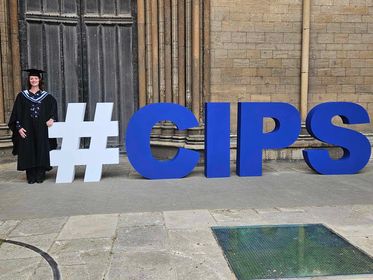Member of the Chartered Institute of Procurement and Supply (MCIPS) is one of the most prestigious qualifications a procurement professional can achieve. This week, we sit down with Louise Walker to discover what she enjoyed most about her CIPS journey alongside the challenges and benefits of becoming MCIPS qualified.

Tell us about your role and organisation.
I am proud to work as the Procurement Lead for Reclaim Fund Ltd (RFL). RFL is the operator of the UK Dormant Assets Scheme and is an arms-length body owned by HM Treasury. Dormant Assets are accounts, funds, policies or shares that have not been accessed for an extended period (15 years in the case of bank and building society accounts). The Dormant Assets Scheme is a voluntary scheme for UK financial institutions, initially banks and building societies, but recently extended to insurance and pensions providers.
Financial institutions who choose to participate try to trace the original asset owners and reunite them with their money. If they unable to do so, they can transfer the value of dormant assets to RFL. RFL guarantees future reclaims, and transfers surplus funds (i.e. those not required to cover future reclaims) to social and community initiatives via the National Lottery Community Fund. So far, over 40 financial institutions have chosen to participate in the Scheme, unlocking nearly £900m for social and environmental initiatives across the UK.

My role within the company has developed and grown at the same time as I have been studying for my CIPS qualifications. I started with the company In 2015 as a “Business Analyst”, which was a varied role involving different aspects of the business. At the time, the team was smaller, and the business had recently separated from operating under the Co-operative Bank. This meant that RFL was now fully responsible for procuring everything it required to operate the business.
The business and team continued to grow, and my role gradually became focused on procurement as we recruited dedicated roles in areas such as reclaim processing, IT, facilities and health & safety. I started my CIPS Level 4 in 2016, and progressed to level 5 and 6 over subsequent years (whilst juggling having a baby and Covid in between!). The expertise I gained from my studies really helped to focus my role and led to my role transitioning to “Business & Procurement Analyst” and now “Procurement Lead”.
In a nutshell, my current role is to ensure a compliant procurement strategy, alongside the management of RFL’s suppliers and service providers. I lead the procurement needs of the business, working closely with government stakeholders to continually develop processes.
Why did you enrol for CIPS?
Initially, I wanted to gain qualifications to formalise my skills, but a huge benefit of doing CIPS was the learning I gained and being able to use that in my everyday job.
Did you study anything else prior to CIPS? If so, how did this compare?
My highest level of study has been A-Levels and an NVQ in Business Admin and these were a while ago. If my maths is correct, I did my A-Levels around 25 years ago! This meant I was a little rusty when it came to studying and exams, but I think that you become more disciplined as you get older, and this really helped me to stay on track. Having a supportive family also helped, giving me the time I needed to study and revise.
What did you like most about studying CIPS?
I found the interaction between other learners in my cohort really helpful. I looked forward to classroom sessions that I was able to participate in through Aspire. These involved interactive discussions that enabled us to translate theory into practice, and also to learn from each other and take great ideas back to our companies.
What CIPS level did you find most challenging?
CIPS Level 6 was definitely the most challenging. I had been studying the previous syllabus and this was changed around the time I started level 6. For me, the introduction of the multiple-choice questions was an added layer of difficulty as I had always thrived on the 3 hour essay style questions and now had to do both. I actually failed my first exam at level 6 (on a multiple-choice exam), and whilst initially I felt a bit disheartened, it gave me the drive I needed not to be complacent. With support from the fantastic tutors at Aspire I was able to focus and pass.

How has MCIPS benefitted you in your job role?
Having MCIPS alongside the effort I have put into my work has enabled be to progress to “Procurement Lead”, where I now have a more strategic role in the business. It also gives that badge of expertise, which gives people confidence in you.
Would you recommend going for MCIPS and what advice would you give to other students?
Absolutely! Having MCIPS opens many doors and if you are planning on a career in procurement I’d say it is a ‘Must Have’. My advice would be to diligently consider your learning route, take it at your own pace and let your family and friends know so that they can support you.
What was your graduation ceremony like?
We graduated in the spectacular Peterborough Cathedral. I had not gained a degree level qualification before, and for many years I told my parents that one day I will have a photo and certificate for them to put on the wall alongside my siblings’ graduation photos, so the build-up for me felt huge. My dad, husband and eldest son were proud to attend and watch me go up on stage for my moment. We soaked up the atmosphere of the day, once gowned I had my photo taken then we had a wander around the grounds and city centre (fully gowned). It was lovely to chat to other graduates whilst waiting for the ceremony to start and learn of their different journeys to MCIPS. The day is a memory I will cherish.
MCIPS is in high demand, with over 58% of employers requesting MCIPS (or studying towards) when recruiting*. Want to know more? Book a free call with one of our expert course advisors here and a member of the team will be happy to discuss your requirements and advise a suitable study option.
*(Source: CIPS Salary Guide 2023)
